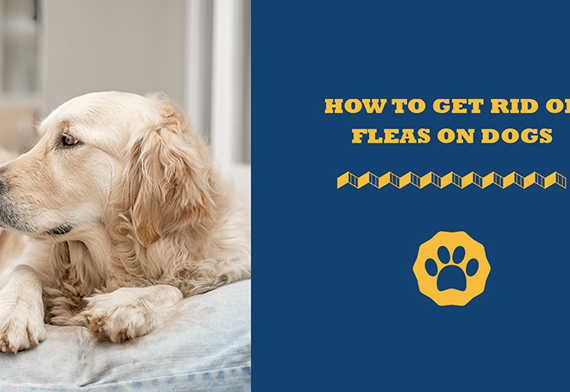Updated: October 13th, 2022
This article contains affiliate links. Read the full disclosure here.
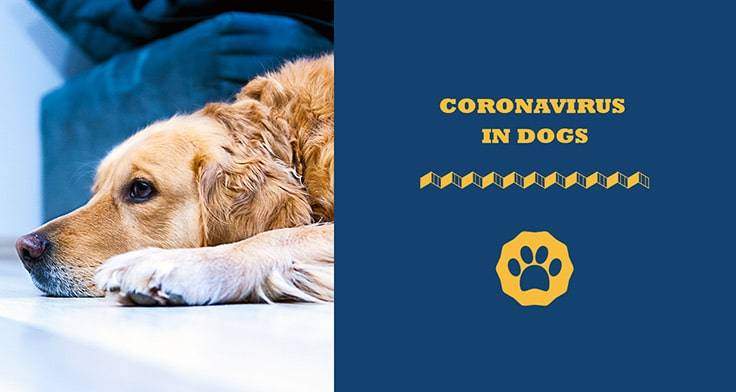
At the end of February 2020, a dog in Hong Kong tested positive for the coronavirus. That is COVID-19, the potentially deadly virus that is currently spreading across the world’s human population on a pandemic scale.
However, this is not a sign that dog owners should start panicking. Experts suggest that there is no evidence that a coronavirus poses a particular risk to domestic animals. They also state that it is unlikely that pets play a notable role in the spread of the virus.
So, what exactly should we be worried about when it comes to pets and coronavirus? Read on to find all the information you need. We will look at:
- What the positive test of the Hong Kong Pomeranian actually means
- The minimal risk that coronavirus poses to dogs
- The limited potential for dogs to be carriers of the coronavirus and transmit the virus to humans
- How to protect your dog from contracting coronavirus
As a note, the current coronavirus, COVID-19, affecting humans, should not be confused with Canine coronavirus. This is a low-threat virus that is common among dogs, and it is not contagious to humans. At the end of this article, we will also look at what Canine coronavirus is and how it should be managed.
Before some information, as most of us are at home, we need to think about how to keep our dogs enjoy their time as well. Here are our suggestions:
-
-
Zuke’s Mini Naturals – Tasty Snacks for Rewards and Suprises
-
True Chews Premium Jerky Cuts – Best Way to keep them Calm
-
ZippyPaws Skinny Peltz – Let them have fun
-
Pet Zone IQ Treat Ball Interactive Dog Toy – Challenge time for dogs
-
Positive Pomeranian?
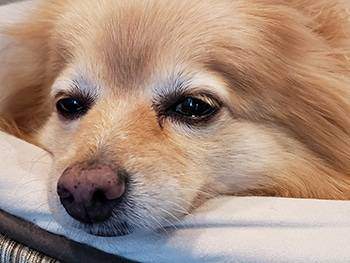 On the 27th of February 2020, and again on the 28th of February and 2nd of March (also 2020), a Pomeranian in Hong Kong tested positive for ]COVID-19. But this does not mean that the dog actually has the virus.
On the 27th of February 2020, and again on the 28th of February and 2nd of March (also 2020), a Pomeranian in Hong Kong tested positive for ]COVID-19. But this does not mean that the dog actually has the virus.
The test of the dog’s nasal cavities showed a “weak positive.” This could suggest that the pooch has a mild case of the virus. It may also suggest that the dog is simply carrying the virus, picked up on its hair and skin but is not infected.
Scientists have now sent off the Pomeranian’s blood to be tested for antibodies. If antibodies are present, produced by the pooch to fight the virus, then the dog is infected. If no antibodies are present, then the canine doesn’t have the virus.
The dog was submitted for testing because its owner was confirmed to have the virus. The pet was quarantined with them. So far, one other dog and one cat have also been quarantined with their owners. Both have tested negative for the virus.
So, it is currently still unknown whether the pup actually has COVID-19, or is simply showing a weak positive response to the test because of their close contact with their owner, who has the virus. Either way, Professor Jonathan Ball, Professor of Molecular Virology at the University of Nottingham, says:
We need to find out more – but we don’t need to panic. I doubt it could spread to another dog or a human because of the low levels of the virus.
Sick Pups?
At the moment the Hong Kong’s government’s Agriculture, Fisheries and Conservation Department says that the Hong Kong dog is under quarantine, but not sick. It seems that the coronavirus does not have a significant impact on animals. Neither dogs nor cats contract the same kind of potentially life-threatening illness or respiratory symptoms as humans when they are infected by the virus.
This would mirror the situation with Sars in 2002-2003. Then, eight cats and one dog were determined to be infected with the virus. But none showed symptoms of being unwell.
This suggests that contracting the coronavirus poses minimal risk to dogs. While they may carry the virus, it does not seem to impact negatively on their health.
Canine Carriers?
But if a dog is carrying the virus, is there a risk that they could transfer the virus to humans? Both the Centre for Disease Control and Prevention and the World Organisation for Animal Health suggest that it is very unlikely for dogs to transmit COVID-19 to humans, and that it is more likely that it is owners that are making their dogs sick.
According to the American Veterinary Medical Association:
Experts have not expressed concern about transmission to or from animals. Multiple international and domestic health organizations have indicated that pets and other domestic animals are not considered at risk for contracting or spreading COVID-19.
To the best of our knowledge, this coronavirus spreads when the virus from an infected person passes to another person, entering the new host predominantly via their nose, mouth, or eyes. This can happen as a result of close contact with an infected person, as their respiratory droplets contain the virus and can easily be breathed in.
It can also happen through contact with contaminated surfaces. Surfaces can become contaminated when someone infected with the virus touches them. The virus is then passed on when another person touches the same surface, and then touches their face, allowing the virus access via the nose, mouth, or eyes.
As a result of this suspected form of transmission, it is recommended that the best ways to limit the spread of coronavirus include:
- Quarantining those infected with the virus
- Encouraging others to avoid touching their faces and wash hands regularly.
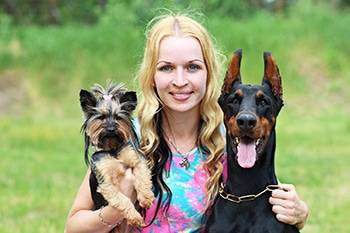 Considering these modes of transmission, dogs are very unlikely to pass the virus to humans. Unlike humans, most dogs have limited contact with humans beyond their owners.
Considering these modes of transmission, dogs are very unlikely to pass the virus to humans. Unlike humans, most dogs have limited contact with humans beyond their owners.
Consequently, they are unlikely to have picked up the virus from a stranger. They also do not come into contact with the surfaces that humans touch the most, such as door handles, handrails, and money; these are most likely to be contaminated.
Therefore, it is significantly more likely that owners are giving coronavirus to their dog than that dogs are giving it to their owners.
-
-
American Journey Salmon & Sweet Potato – Best Food to keep Dogs strong
-
Taste of the Wild High Prairie Grain-Free Dry Dog Food – Recommended Healthy Food
-
No More Marking Pet Stain & Odor Remover – Keep Home Clean
-
Frisco Training & Potty Pads – Toilet at home
-
Protecting Pets
While COVID-19 does not pose the same threat to dogs as it does to humans, we still want to protect them from needlessly catching the virus. And this can be achieved simply:
- Limit your dog’s exposure to humans outside of the household. This will reduce the likelihood of them coming into contact with someone infected with the coronavirus.
- For the time being, avoid the kind of play with your dog that includes having your faces close together. This is when they might breathe in your respiratory droplets, which may be infected.
- Wash your hands before playing with your dog. This ensures that they are not exposed to the virus picked up on your hands from another surface. Of course, also wash your hands after playing with your dog.
- You are probably paying extra attention to the cleanliness of your home to protect yourself and other human members of the family from picking up the virus from contaminated surfaces.
Extend this care to your dog. Make sure to clean their bowls after every meal, and wash things, such as their bedding, a little more frequently.
Quarantine Required?
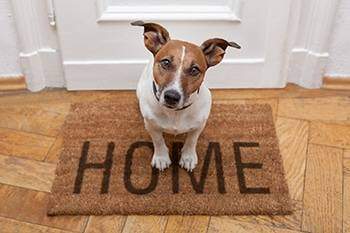 It is currently recommended that the pets of individuals determined to have the virus should be quarantined along with their owner. This is to help prevent the spread of the virus. As is probably the case with the Hong Kong Pomeranian, the dog may well not be infected by the virus.
It is currently recommended that the pets of individuals determined to have the virus should be quarantined along with their owner. This is to help prevent the spread of the virus. As is probably the case with the Hong Kong Pomeranian, the dog may well not be infected by the virus.
Rather, it seems to have picked up the virus on its hair and coat from contact with its infected owner. This turns this household pet into a contaminated surface that could facilitate further infection, just like a dirty doorknob or well-used ten-dollar bill.
On the positive side, the continued companionship of their favorite pet may well be a great comfort to owners infected by the virus as they suffer through the isolation of quarantine and the uncertainty of the illness. Dogs have been shown to be able to reduce anxiety and stress.
Canine Coronavirus
But household pets may be receiving unfair attention in the fight to stop the spread of COVID-19 due to the existence of the similarly named Canine coronavirus and Feline coronavirus. Both are common and non-life-threatening viruses among domestic animals that were identified around 50 years ago. Neither form of coronavirus, canine or feline, is transmittable to humans.
This form of coronavirus causes intestinal infections among domestic animals. This may cause dogs and cats considerable stomach discomfort for a period of two to ten days. However, the pet can continue to be a carrier of this highly infectious virus for up to six months after the symptoms have passed.
Canine and Feline coronaviruses are highly contagious between animals. It is picked up through oral contact. This means direct contact with an infected dog or cat, eating from a contaminated food bowl, or, very often, eating infected fecal matter. (One more reason to scoop that poop immediately).
While there is no treatment for these types of coronavirus once it has been contracted, aside from palliative aids to relieve pain, a vaccine does exist. Nevertheless, this vaccine is not generally recommended as common strands of the virus are not very dangerous.
More problematic mutations also exist, but the vaccine has not yet proven highly effective against these mutations. Vaccinations are generally only recommended when dogs are being introduced into an environment where the virus is known to be present.
The Verdict
The prevalence of Canine coronavirus among dogs should not be giving owners undue concern in the midst of the rise of a different type of coronavirus, COVID-19, among humans. The two are unrelated and Canine coronavirus cannot be transmitted to humans.
Despite the recently well-publicized case in Hong Kong, dogs and cats are unlikely to pick up the COVID-19 virus. Moreover, if they do become infected with the virus, it is very likely that they were infected by their owner.
They are unlikely to have caught it elsewhere and transmitted it to their human families. Dogs that do find themselves in a household that has the virus are not at high risk. They are not affected in the same way and do not display the same respiratory or more serious symptoms.
Thus, pet lovers can rest easy that their dogs and cats are very unlikely to pass the virus to them. And while COVID-19 poses no great threat to dogs, a few simple precautions can help limit the possibility of human family members passing the virus to their canine companions.
Nevertheless, when coronavirus (COVID-19) is detected in a household, as a precautionary measure, domestic animals will most likely need to be quarantined with their owners. This may provide a level of comfort to humans infected with the virus during a difficult time.


